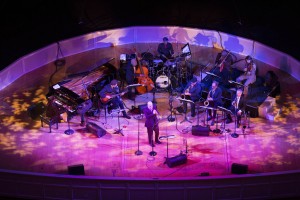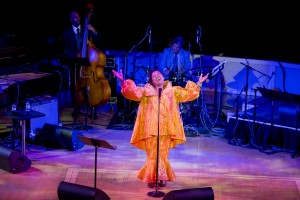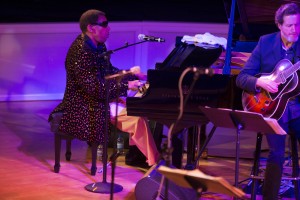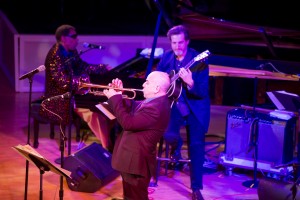
Butler, Bernstein & the Hot 9, Orchestra Hall @ Symphony Center; photo by Todd Rosenberg Photography
Butler, Bernstein and the Hot 9 — that’s pianist Henry Butler, brassy brassman and arranger Steven Bernstein, and their touring NYC-based all-stars — plus beloved local singer Dee Alexander with her trio were double billed on a cold, cold night last week (Feb. 27) at Chicago’s downtown Orchestra Hall in Symphony Center. ![]()
![]()
![]() It was the first time I’ve been to hear jazz at the 2500 seat concert venue, built in 1904 as designed by architect Daniel Burnham to be the Chicago Symphony Orchestra’s home, since returning to Chicago eight months ago, and the experience was both pleasurable and problematic.
It was the first time I’ve been to hear jazz at the 2500 seat concert venue, built in 1904 as designed by architect Daniel Burnham to be the Chicago Symphony Orchestra’s home, since returning to Chicago eight months ago, and the experience was both pleasurable and problematic.
The musical program was smartly balanced, mainstream-progressive and entertainment-oriented, like all the bookings in the 10-month jazz series (continuing April 17 with duo pianists Herbie Hancock and Chick Corea; May 15 with Lebanese-born/French trumpeter Ibrahim Maalouf and pianist Jacky Terrasson plus pianist Jean-Michel Pilc; June 19 with drummer-composer Dana Hall’s commissioned work celebrating the 75th anniversary of the publication of Native Son). Director of programming James M. Fahey has solid, eclectic taste, and has brought Eddie Palmieri’s Latin Jazz Band, the Dave Holland-Kenny Barron duo and clarinetist Ken Peplowski with Django/gypsy stylists to town, as well as Dianne Reeves and — wait for it — Wynton Marsalis with the Lincoln Center Jazz Orchestra.
Ms. Alexander, a youngish veteran with a wide range both octave- and repertoire-wise, was making her long-awaited and![]() well-deserved Orchestra Hall debut, and should be invited to return. Re predecessors, she’s out of the Sarah Vaughan camp but writes much of her own material and last summer at the Chicago Jazz Festival was strong in a Nelson Mandela-tribute for big band led by AACM saxophonist Ernest Dawkins. Her performances are always imbued with bluesy, personal warmth that makes even occasional awkward turns of phrase (can the word “dysfunctional” work in a lyric?) forgivable/ignorable. She opened with a graceful rendition of Billie Holiday’s flirtatious “Now Baby or Never,” included her original “Butterfly” which shows off dazzling extended vocal techniques, and ended with “Lonesome Lover,” by Abbey Lincoln comprising both scat singing and a clarion call (it’s on Dee’s most recent cd, Songs My Mother Loves). Throughout, her trio of pianist Miguel de la Cerna, bassist Junius Paul and drummer Yusef Ernie Adams was supportive if not assertive, and from a perch in the third balcony, sound was clear if softer than I would have preferred.
well-deserved Orchestra Hall debut, and should be invited to return. Re predecessors, she’s out of the Sarah Vaughan camp but writes much of her own material and last summer at the Chicago Jazz Festival was strong in a Nelson Mandela-tribute for big band led by AACM saxophonist Ernest Dawkins. Her performances are always imbued with bluesy, personal warmth that makes even occasional awkward turns of phrase (can the word “dysfunctional” work in a lyric?) forgivable/ignorable. She opened with a graceful rendition of Billie Holiday’s flirtatious “Now Baby or Never,” included her original “Butterfly” which shows off dazzling extended vocal techniques, and ended with “Lonesome Lover,” by Abbey Lincoln comprising both scat singing and a clarion call (it’s on Dee’s most recent cd, Songs My Mother Loves). Throughout, her trio of pianist Miguel de la Cerna, bassist Junius Paul and drummer Yusef Ernie Adams was supportive if not assertive, and from a perch in the third balcony, sound was clear if softer than I would have preferred.
Acoustic issues, however, had a negative impact on the denser, more complicated ensemble music Bernstein and Butler have devised for their Hot 9. This touring troupe has released Viper’s Drag, first recording on the newly revived Impulse! label, with idiomatic originals and revisits of works by Jelly Roll Morton and later Crescent City piano professors including James Booker and Professor Longhair. Butler is a volatile and versatile two-fisted pianist who also gives throaty immediacy to songs (this night, the ever-funky “Buddy Bolden’s Blues”). Bernstein’s charts for a band of longtime comrades with “downtown” cred — trombonist Curtis Fowlkes, tenor saxophonist Peter Apfelbaum, clarinetist Doug Weiselman, bassist Brad Jones among them — feature the good-time spirit of New Orleans polyphony, akin to what Morton wrought from 1926- ’30 with his never equalled Red Hot Peppers.
But to really enjoy a nine-piece (ten, counting Butler) band, you’ve got to be able to hear everyone all the time, and the house mix in this case wasn’t up to the challenge. Orchestra Hall has long been criticized and a couple times renovated due to significant concerns about the acoustics; according to Wiki, in one renovation 50% of Burnham’s original interior was destroyed.
No concert hall engineered more than 100 years ago with symphonic orchestras specifically in mind is going to be an automatic good fit for groups with amplification and traps drums. We know there’s an art to live mixing — and the best financed touring bands (including, for instance, Marsalis’ LCJO) travel with their own sound technicians. The Hot 9 + Butler doesn’t carry anyone to be at the mixing board (Corea and Hancock upcoming will do so). From the start of the second half of this concert I couldn’t make out Bernstein’s trumpet playing — which is hardly ever a problem — and Butler’s grand piano seemed like a very trebly electric keyboard.
Moving to the rear of the first floor, I still had trouble discerning Berstein’s solos on baritone horn, much less the violin (sitting next to the trombone) or niceties in the three-reeds line. Electric guitar rang out, but bass and drums were dim, and the group harmonies were tonally colorless.
During the course of the set the sound improved slightly, and the band remained jolly. The irrepressible nature of this music survived, and when the musicians (except Butler) left the stage briefly to parade, playing, through front-of-hall seating, the audience was roused to a standing ovation. Afterwards Bernstein kvelled about the onstage sound, so what was coming from monitors evidently worked for the performers. But when a friend who’d been sitting elsewhere asked me how I liked the music, I couldn’t say. I felt like I hadn’t really heard most of it. And when 10 experts in ensemble improvisation are pumping the second-line rhythms of “Iko Iko” to little more effect than a muffled roar, that just ain’t right.
Orchestra Hall staff doesn’t deny the problems and are at work to improve matters, so I’m encouraged to try the venue again. Some music, after all, will not be presented anywhere else. Dana Hall’s ambitious project in consideration of Native Son may be a must-hear.
Subscribe by Email |
Subscribe by RSS |
Follow on Twitter
[contextly_auto_sidebar id=”W4p8uMKddebBYhnIakLFKqVTghwTgJ9SM”]



